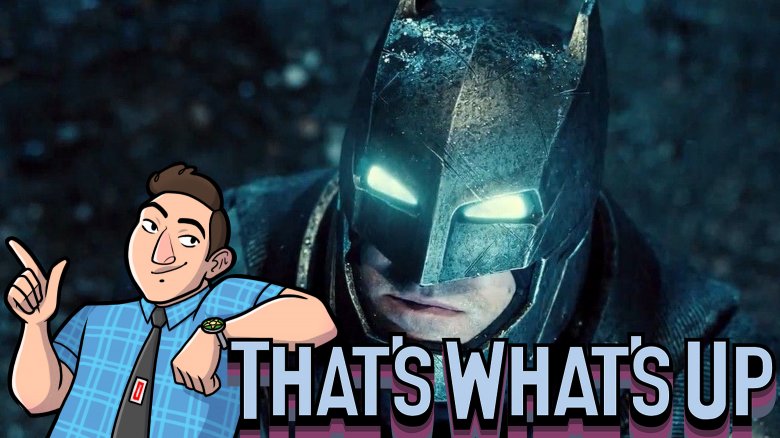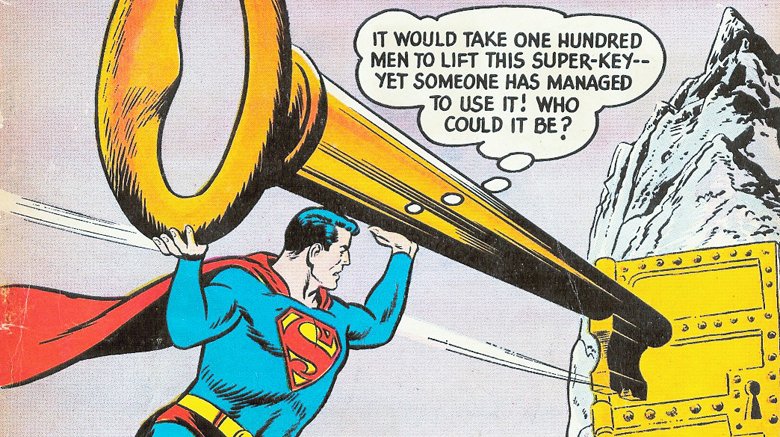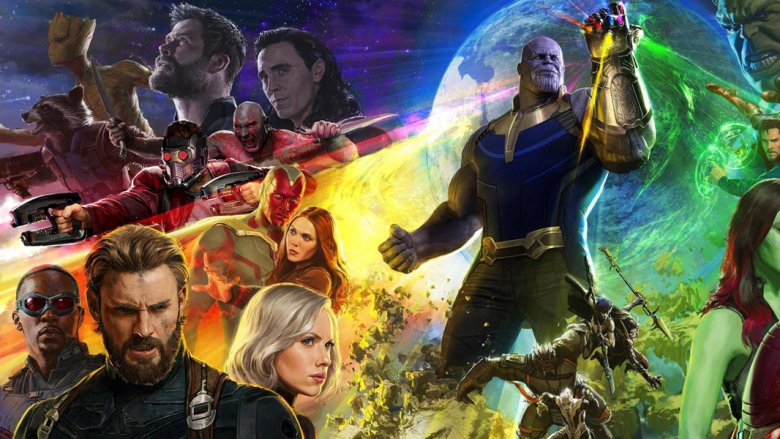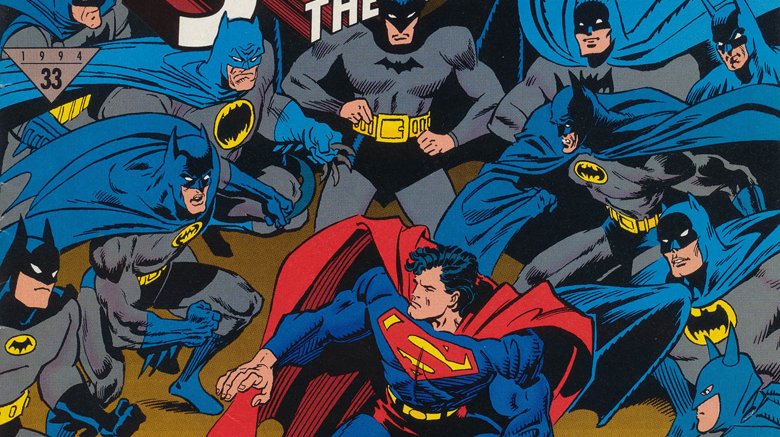That's What's Up: How The DC Movies Could Change Batman Comics Forever
Each week, comic book writer Chris Sims answers the burning questions you have about the world of comics and pop culture: what's up with that? If you'd like to ask Chris a question, please send it to @theisb on Twitter with the hashtag #WhatsUpChris, or email it to staff@looper.com with the subject line "That's What's Up."
Mass media interpretations can alter how characters are perceived. For many people Christopher Reeve is Superman and Adam West is Batman, no matter what. What influence do you perceive Ben Affleck and Zack Snyder having on Batman stories as time goes on? — @S_Theodore
You're absolutely right. While it's tempting to think of the comics as this inviolably pure source material from which all other adaptations flow, superhero comics have been shaped by their mass-media counterparts for as long as there have been superhero comics. Even back in the '40s, when Superman comics were stocked on every newsstand in America and being passed around to readers of all ages, they were still taking their cues from the radio show, which introduced long-lasting concepts like Jimmy Olsen, and even Kryptonite.
The simple fact is that different media requires different things from a story. When you have an ongoing, "living" saga like you have with superhero comics — and virtually no other form of media — you get to pick and choose what works so well in those adaptations to improve the comics, which in turn makes for better adaptations. That's the theory, anyway. I know I'm sour about it, but I can't imagine the current run of DC movies improving anything about Batman. That's a good thing, though, because I'm also not sure that they'll even have the chance.
Picking and choosing
Don't get me wrong; it's not that I'm opposed to comics picking things up from TV, movies, even video games. I'm on the record as being a pretty big fan of Superman's Pal, and every time I read a Batman comic — which is probably more often than I do anything outside of breathing — the voice I hear in my head is Kevin Conroy's note-perfect growl. It makes sense that it would be, too, considering that he's been capital-T The voice of Batman for almost as long as I've been aware of the character. And that's just one aspect of how Batman: The Animated Series influenced the comics. Given how popular she is 25 years after she first appeared on that cartoon, it's honestly hard to imagine any kind of DC Universe that doesn't have Harley Quinn in some form or another.
I even like it when the influences are more of a two-way street. For all that people like the revisionist history that says the popularity of the 1966 Batman show was responsible for making the comics goofier — and for all that the third season of Batman got really weird with its minimalist sets and hatching dinosaur eggs — going back and reading the Batman comics of the era tells a different story. Most of the episodes in the first season are directly adapted from the comics, and once the show ended in 1969, Batman comics were pretty quick to try going back to darker crime stories to balance it out.
The problem was that the show was so good at balancing Lorenzo Semple's goofball satire with Adam West's stentorian earnestness that it changed how people who only knew about superheroes from the TV show thought of both the superhero genre and comics in general. We had about 50 years of "Biff! Pow! Comics aren't just for kids anymore!" headlines, and the only reason we're not still getting them is that movies featuring Thanos, Ego the Living Planet, and Bucky Barnes have pulled in something like 13 billion-with-a-b dollars at the box office. Never let anyone tell you that we are not living in blessed times, friends.
Anyway, what I'm getting at here is that there's always been that give-and-take relationship between comics and the media they inspire, and that's a good thing. Except when the thing that's being given-and-taken is replacing something that was actually better in the comics.
Fort Superman
That's right: I'm talking about the Fortress of Solitude.
The original Silver Age Fortress — or "Fort Superman," as it was called in that first appearance, which rules — was great. It's got a giant golden door that can only be unlocked by an equally giant golden key, exactly the kind of ridiculously over-the-top imagery that works so well when you're dealing with a character who can punch out planets and bust out a standing vertical leap that can take him all the way to the moon. And once you get inside? There's a towering memorial to Jor-El, Lara, and the planet Krypton, a bottled city that was miniaturized by a superintelligent alien cyborg, and, in most portrayals, a trophy room that includes the Titanic, lifted out of the depths of the sea as dropped into his super-museum for no discernible reason.
It's the kind of strange, big imagery that tells you exactly what you need to know about Superman. Specifically, it tells you that he's capable of doing the impossible, and is also kind of a weirdo. It's perfect, and I love it.
And yet, you don't really see that version of the Fortress anymore. Instead, you get this.
A Big Pile of Crystals
Here's my blisteringly Hot Take on the 1978 Superman movie: it's not actually that good.
Don't get me wrong, Christopher Reeve's performance in those movies is unimpeachably great, and if nothing else, really sells the idea that no one would suspect Clark Kent was Superman. He's mentioned less, but honestly, Gene Hackman is almost as good — and a lot of that "almost" comes from the fact that while Reeve had the Good Idea that is Superman to work with, Hackman had to sell a nuclear missile real estate scheme, which gave him a much bigger hole to dig himself out of. But, and here's the contrarian hill I'm willing to die on, that's about all those movies have going for them, especially the first one. It's incredibly self-important from the first frame, and is frequently boring and bloated — it takes a full 47 minutes for Superman to actually show up, and the stuff before that involves this weird idea that he goes and lives with his dad's ghostly floating head for like ten years so that he can learn how to be Superman.
And the place that he goes with Dad Head is, of course, the Fortress of Solitude. But it's not the Arctic fortress with the giant key that was seen in the comics. Instead, director Richard Donner's film reimagined both the Fortress and Krypton as being built out of crystals, resulting in Superman's cinematic Fortress being this allegedly majestic crystalline lean-to. Personally, I think it looks like Superman moved into a discount chandelier that fell off a truck outside a Home Depot, but other people seem to like it a lot.
And because they liked it, and the movie around it, the crystalline Fortress pretty much replaced the old Fort Superman completely, both in other mass-media projects like Smallville and Supergirl, and also on the comics page. On one hand, that makes perfect sense. For all its flaws, Superman '78 presented its title character with a visual grandeur that had never been seen before. The sight of Superman easily hefting a helicopter with one hand while charming Lois Lane with that winning smile blows anything that George Reeves did on the Adventures of Superman TV show out of the water, and honestly rivals a lot of great moments from the comics. Picking up the design of the fortress is an easy way to remind people of the feeling they got the first time they heard that soaring John Williams score.
On the other hand...jiminy Christmas, It's not even a dang "fortress!" You can just walk right into it, which actually happens in Superman II! If supervillains can just roll up on a Tuesday afternoon because nobody on Krypton ever got around to inventing doors, then that's a bad design for a headquarters, my fellow! That's gonna cause problems! You should not be able to just walk to Superman's house, and there is no way that a pile of crystals is not way more boring than a giant golden key and a Bottle City!
Movie magic
That's the kind of thing that can just slide right in, but also, it's a fairly isolated incident. The crystal Krypton and artists drawing Superman so that he bears a more-than-passing resemblance to Christopher Reeve are things that persist even 40 years after that movie was in theaters, but there were also relatively few of them — four movies in ten years. Nowadays, though? The sheer amount and popularity of superhero films means that sooner or later, their influence is going to wind up being almost incalculable.
Here's the thing: at this point, I think you could make a pretty compelling argument that the primary versions of Marvel's major characters are the ones in the movies, not the comics. That's not something I say to be dismissive of the comics — as much as I like those movies, comic books are by far my favorite medium, and I love the Marvel Universe of the comics as both a reader and someone who's done work for the company. It's just a matter of sheer numbers. The MCU is the kind of sprawling shared universe that's unprecedented in every medium except comics, with, as of this writing, 18 movies over the course of a decade, with three more on the way this year, plus a handful of TV shows, too.
And it's not just that there's a lot of them, either, it's that they're also massively successful. They have a global reach that comics creators dream of, and a recent Time article on Black Panther pinned the figure of what they've made at the box office at a cool $13,500,000,000. Those movies have fans that are as passionate as anyone who's ever dug through back issue bins, and have somehow managed to be popular with both casual moviegoers and the kind of bitter weirdos who complain about how Superman's Fortress of Solitude sucks if it doesn't have a giant golden door. They are, by any measure, the big deal.
I don't think they're ever going to truly supersede the comics, and I don't think anyone really wants them to. One of the things that makes those movies so great is that they're standing on the shoulders of comic book giants like Jack Kirby, Stan Lee, Steve Ditko, Christopher Priest, Walter Simonson, and more. But at the same time, translating the magic that works on the page to a form that works on the screen isn't as simple as just recreating your favorite panels. An adaptation has to work on its own merits, and at this point, the Marvel movies have proven that they can do that pretty well. Sure, they're technically adaptations, but so's Die Hard, and nobody ever talks about that movie being great because it did a good job recreating the novel.
But there's another thing, too, and it finally gets us back to the question that you asked in the first place: the Marvel movies aren't the DC movies, and, maybe even more importantly, the Marvel Universe isn't the DC Universe.
The One True Batman
A huge part of the appeal of the Marvel Universe of the comics is that it's a universe. There's a tight continuity, people show up in each other's comics and swap villains, and there's a cohesive feeling there that makes it easy to be a fan of the whole thing instead of just a single part. As much as comics readers and creators debate about the dreaded spectre of continuity looming over books and providing a potential barrier to new readers, it's one of the things that makes those comics work.
That's reflected in the movies, too — one of the best parts of the entire MCU is how cohesive it is. The "down side" of that level of continuity is that that 19th movie only makes sense if you've seen the 18 movies before it, but the upside is that everybody actually has, and they love the way that Doctor Strange can show up in a Thor movie that guest-stars the Hulk.
The DC Universe, however, is different. There's continuity and history, sure, but since it wasn't created by a small, tight-knit group of creators, it's never been as cohesive as Marvel has. As a result, they've always been a lot more willing to play around with or even get rid of their own continuity, whether it's in a big way like restructuring their entire universe in books like Crisis on Infinite Earths, or in smaller ways by just doing different takes on their heroes. That's how you get those out-of-continuity stories that can often feel timeless, like The Dark Knight Returns, or All Star Superman, or even Kingdom Come. There are enough deviations from the main continuity, whatever it is at the time, that it's entirely possible to be a huge fan of Batman comics without ever reading an issue of the regular monthly series.
But that also gives the DC characters a kind of malleability that the Marvel heroes don't have. I think we're all up for seeing a few changes for the movies as long as that core idea goes to the screen, but that core idea has a lot more to work with when you're dealing with Batman. He can be a square pop-art crimefighter and a bitter old man who wants to punch Superman, and they're both pretty equally rooted in the source material.
Batman v Consistency: Dawn of Justice
So what does that mean for the influence of from the Snyder movies? I honestly don't think we're going to see much at all, and believe it or not, that's not entirely wishful thinking on my part. I'll freely (and frequently) admit that Batman v Superman is a movie that I hate more than any other film I've seen in my lifetime, and I sincerely hope that nothing about it ever makes it into any other piece of media ever. That said, I also realistically don't think it's going to happen, for two reasons.
First, I mean, what are they going to do, try to make Batman comics more like The Dark Knight Returns? They've been trying to do that since about 30 seconds after that comic came out the first time, and we've actually just gotten to the point where the pendulum has swung back around to a different approach.
The Dark Knight Changes… or not
Second, and probably more importantly, we've all seen this sort of thing happen before without ever really affecting the comics that much. Look at The Dark Knight, which gave Batman fans what was an incredibly well-received film, netting Heath Ledger a posthumous Academy Award for his portrayal of the Joker and racking up a staggering billion dollars at the box office. It even came out at a time when DC was looking to change things up, as evidenced by the fact that they'd relaunch their entire line with "The New 52" three years later.
And yet, as someone who was reading Batman comics every single month at the time and since, I can tell you that it had shockingly little impact on the comics. There was one pretty forgettable out-of-continuity graphic novel about the Joker, but other than that, nothin'. I think maybe people started drawing the Joker with those scars a little more frequently, but that's about it.
And that applies to that whole trilogy of incredibly well-received, profitable, and popular Batman movies — well, two movies that everyone liked and one that could charitably be called "divisive," anyway. Almost ten years later, we finally got a story about the League of Shadows, which is what Batman Begins called the League of Assassins, but that's honestly the only thing I can think of. Weirdly enough, the mass media project from that era that did have a noticeable impact on Batman stories was Brave and the Bold, the team-up cartoon that brought back Bat-Mite and had Batman fighting ghosts with Nth Metal Batarangs. Looking back, that's the one that seems like it was on the leading edge of where Batman comics would be going for the next decade, not The Dark Knight, and I say that as someone who likes both of those things a whole heck of a lot.
If the Dark Knight trilogy didn't have a huge impact on Batman comics, it's pretty hard to imagine that the "DCEU" movies would. That's not a guarantee that they won't, of course, because you can never really tell what's going to stick until you're a few years removed from it, and it's not always the things you might expect. BTAS and, arguably, Batman '89 had a huge influence on an entire generation of creators, but Smallville, for instance, ran for a full ten years and doesn't seem like it did a whole lot to change Superman at all. Once the viewers who grew up with that version of Superman start making their own comics, we might start seeing it, but I doubt it'll happen, and the same goes for stuff like Man of Steel.
Honestly though, I just want us all to come together as one and admit that the phrase "Extended Universe" is nonsense that doesn't mean anything.
Each week, comic book writer Chris Sims answers the burning questions you have about the world of comics and pop culture: what's up with that? If you'd like to ask Chris a question, please send it to @theisb on Twitter with the hashtag #WhatsUpChris, or email it to staff@looper.com with the subject line "That's What's Up."



